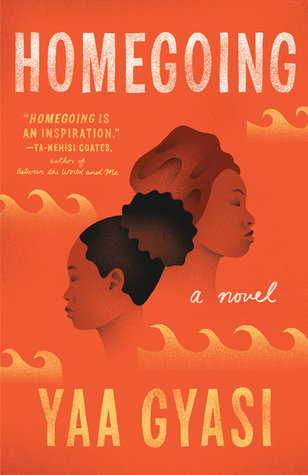review
 title: Homegoing
title: Homegoing
author: Yaa Gyasi
barnes & noble | book depository | amazon
publishing: June 7th, 2016 by Vintage
format: paperback
source: The Novel Neighbor
genre: historical fiction; literary fiction
awards: American Book Award (2017), among others
date read: August 2018
Ghana, eighteenth century: two half sisters are born into different villages, each unaware of the other. One will marry an Englishman and lead a life of comfort in the palatial rooms of the Cape Coast Castle. The other will be captured in a raid on her village, imprisoned in the very same castle, and sold into slavery.
Homegoing follows the parallel paths of these sisters and their descendants through eight generations: from the Gold Coast to the plantations of Mississippi, from the American Civil War to Jazz Age Harlem. Yaa Gyasi’s extraordinary novel illuminates slavery’s troubled legacy both for those who were taken and those who stayed—and shows how the memory of captivity has been inscribed on the soul of our nation.
thoughts
Ever since reading The House of Spirits by Isabel Allende this spring (or perhaps even before that) I’ve found myself increasingly attracted to multi-generational stories and novels. Homegoing had thus been on my radar for awhile, but it wasn’t until my godmother allowed me to pick out a book at my local indie bookstore this summer that I really had a chance to check it out for myself. From the moment I re-read the blurb I was instantly reminded why multigenerational stories are so fascinating to me– and I can promise that the stories execution is nothing short of amazing.
Homegoing opens first with two key pieces of non-prose, the first being an epigraph with an Akan proverb about the perception versus the reality of families, and the second being the family tree. From the get-go the family tree was a page that I flagged because I had the sense that it was something that I would want to refer back to–and I did. Because of my travels, my reading time is more broken up than I typically prefer, thus the family tree helped guide me back into the story and keep track of which characters were decedents from which half of the family. I recommend using it frequently!
From the beginning, I became invested in Gyasi’s debut for two main reasons. The first being that each of her characters were so delicately layered and complicated that I couldn’t help but be utterly fascinated by their role in the narrative as a whole. The second reason being that Gyasi’s novel relied heavily upon traditions found in oral storytelling, which helped ground the prose in the historical context. Moreover, the historical nature of this novel was another aspect to consider entirely. I continued to be impressed again and again by how detailed Gyasi’s historical accounts were and how fluidly she moved between the different eras encompassed in the novel.
Homegoing‘s use of symbolism in the portrayal of the the black experience across several centuries also stood out to me as a reader. Though some may be thrown by the frequent shift in character (and general lack of a single “protagonist”), I remained engaged in the storyline threaded throughout because of the repeated use of fire, the necklaces, and other frequently referenced objects (symbols). This novel also addressed colorism (and colorism across time) in a way that I hadn’t seen approached before, which provoked thinking and further consideration in me as a reader (as I suspect it will in others).
As with any multi-generational novel, Homegoing was ripe with a focus on familial relationships and deep character examinations. As someone particularly fond of character driven novels, I am pleased to say that Gyasi’s rendition may be my favorite as of late. Her writing not only engaged the reader but so effortlessly engaged with itself that I was itching to continue reading every time I had to put this one down. In fact, there were times where I was so fervently reading that I stopped and realized that Gyasi had me reading the way that I do with a thriller–urgently and emotionally.
in summary
Homegoing is quite possibly the most captivating novel I have ever read. So deeply rooted in the evolution of the black experience, readers will find themselves on the edge of their seats for every emotional journey found in this narrative. Taking place over the course of centuries, Yaa Gyasi has crafted the ultimate multigenerational novel, full of pain and grittiness and love and redemption. I couldn’t have been more delighted to have had this novel pass through my hands and the words pass through my mind. This is not one to miss.



